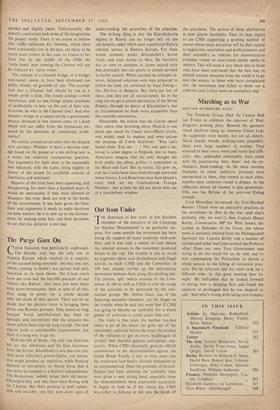Marching as to War
MALCOLM RUTHERFORD writes:
The Freedom Group filled the Caxton Hall last Friday to celebrate the takeover of Wad- dington's printing press. Beneath the speakers' raised platform hung an immense Union Jack; the supporters were mainly, but not all, ,elderly. Naval beards, tweeds, walking-canes abounded; there were large numbers of women. •They strained to hear every word and• many had diffi- culty; they applauded continually, were ready with the punctuating 'hear, hears' and the en- thusiastic head-nodding. As the more extreme examples of union restrictive practices were enumerated to them, they turned to each other, mouths open, eyebrows raised in dismay. At the collection almost all seemed to give generously. This was the Britain of the post-war Ealing comedy.
Lord Moynihan introduced Air Vice-Marshal Bennett ('There were no restrictive practices in, the aeroplanes he flew in the war—and that's probably why we won!'), then Captain Henry Kerby, Conservative MP for West Sussex, de- scribed as Defender of the Cause, but whose name is curiously omitted from the Distinguished Sponsors' list. Captain Kerby told a number of curious and rather bad jokes around the Profumo affair. 'Even our own Tory Government was trying to do too much for us, he said, and h2 was campaigning for Parliament to devote a whole session to the killing of restrictive prac- tices. But he believed, and his voice took on a different tone, 'in this great meeting here to- night.' He half-joked that he looked forward to taking over a shipping firm and found the applause so prolonged that he was inspired to add, 'And what's wrong with taking over London docks?' The meeting was rampantly with him.
Mr. Benning, the man who is looking after the technical side of the new press, spoke next. He is a doer (Captain Kerby is apparently a thinker) and he loves it. His voice gloated: 'I love beating people who indulge in restrictive practices.' He was gratified and surprised at the number of union members who had turned up at the works that morning to resume their jobs. He had arrived there at 5.30 a.m. and Mr. Martell had been there before him. Mr. Martell took the stage. 'We're here because the Tory Party isn't doing its job properly.' He wanted to see a government that would sack Sir Edward Boyle for not having sacked his health adviser, Dr. Henderson.
Mr. Martell switched: it was the bosses who were allowing the unions to run amok. Since the Waddington news the Freedom Group had been offered thirty to forty London printing works; they would be taking over a large Scottish works before Christmas and were already in the pro- cess of getting a London works that employs more men than Waddington's, In future, how- ever, the news would not be broken until he had been able to put the terms to the prospective employees; Waddington's had deliberately pre- vented this. As for the press as an organ of opinion, the Yorkshire Post had written a leader in support of them. But the press for this pur- pose was mainly the Spectator; Mr. Martell in- dignantly quoted an article by Henry Fairlie, whom he described as `now a journalistic gad- about,' and a letter from Correlli Barnett, both of whom, he said, had all but called him a fascist. But the press had better watch out. There were two (and he wasn't including the Herald) —Mr. Martell advanced to three—London daily newspapers which may soon come on the market. He didn't think Captain Kerby was joking about a shipyard at all; had they not been three times oversubscribed for Wadding- ton's? And now the Freedom Group was de- veloping tactics worthy of their opponents. They wanted to clean up public life. They had done so well in the Bristol by-election because they had attacked Mr. Wedgwood Benn personally; they were going through Who's Who compiling a list of other socialist humbugs they could ex- pose. Woodrow Wyatt would be one of the first. Yet, Mr. Martell concluded, what could they do in the end but work through the Tory Party? Every single thing they believed in, said he, was traditional Tory policy. Everyone present should go out and join their local Conservative associa- tion and influence it as he was already influencing his own ward in Hastings. With a strong cry of 'No more Macleodism!' the meeting ended.



































 Previous page
Previous page